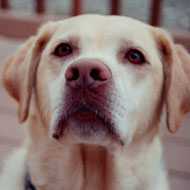
Largest study to date offers clues for human disease
US scientists have carried out the largest study yet of dog genetics, garnering important information about human diseases.
The team from Cornell University looked at 180,000 genetic markers, which can help to link inherited diseases with the responsible genes.
"The more we know about the genetic diseases of diseases, the better we are at keeping pure-bred dog populations genetically healthy," said senior author Adam Bokyo.
This work is a big step forward in mapping the genes responsible for complex diseases in dogs, most of which are very similar in people.
Dogs and humans share more than 350 diseases, including lymphoma and hip dysplasia. According to the study, which has been published in the journal, Nature Communications, similar pathways and genes often underlie these shared diseases.
As genetics in dogs are so much simpler, studying them is a "useful and underused way to understand genetic diseases from a human perspective," Bokyo added.
The team managed to identify parts of the genome that are linked with hip dysplasia, elbow dysplasia, idiopathic epilepsy lymphoma, mast cell tumour and granulomatous colitis. Genes that influence body size, fur length and shedding were also pinpointed.
"We found 17 genes for body size in dogs, and by looking at those genes we can predict a dog's size with 90 per cent accuracy," Bokyo explained. This is much easier in dogs than in humans, where undress of genes affect body size.
Typically, human disease-mapping studies involve genotyping tens of thousands of individuals and studying one million markers across the genome. The team from Cornell say that in dogs, they expect to be able to identify genetic risk factors for most major diseases with just 1,000 dogs and 1,000 controls.
Complex disease and phenotype mapping in the domestic dog: http://www.nature.com/ncomms/2016/160122/ncomms10460/full/ncomms10460.html



 The Veterinary Medicines Directorate (VMD) is inviting applications from veterinary students to attend a one-week extramural studies (EMS) placement in July 2026.
The Veterinary Medicines Directorate (VMD) is inviting applications from veterinary students to attend a one-week extramural studies (EMS) placement in July 2026.